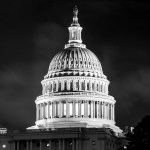U.S. telcos hoping to shake AT&T and Verizon out of their comfort zone had cause to cheer this week when the Federal Communications Commission (FCC) confirmed its plan to reserve spectrum for smaller players in next year’s incentive auction.
The regulator has set aside 30 MHz of 600-MHz spectrum for service providers that currently hold less than a third of the available low-band spectrum in a given licence area.
This is good news for competition, particularly in some rural a nd remote areas where consumers are stuck with either one of AT&T and Verizon, which already own plenty of the sub-1-GHz frequencies required to cover the hardest-to-reach locations.
However, there are some players out there that were hoping for just that little bit extra from the FCC.
"We are pleased that the Commission locked in an unprecedented spectrum reserve, but are obviously disappointed it was not expanded to 40 MHz," said a statement from Save Wireless Choice.
Indeed, the pressure group has been lobbying the FCC to not only follow through with its plan to reserve bandwidth for the little guys, but to increase it by 10 MHz.
In the run-up to the decision, T-Mobile US was the most outspoken member of Save Wireless Choice – we’ll give you one guess as to why – accusing AT&T and Verizon of swarming the FCC and trying to force the watchdog to back down.
Despite not getting everything he wanted, T-Mobile US chief executive John Legere took to Twitter to express his pleasure, and he didn’t even swear.
"It’s unprecedented, will benefit consumers and encourage competition," he said, adding that the reserve includes "great quality spectrum."
"T-Mobile is committed to showing up, playing hard and being successful at the auction," he added.
While on one hand the FCC has this week strengthened one player’s chances of challenging AT&T and Verizon, another upcoming decision by the regulator may significantly weaken another’s.
The FCC has all but officially decided that Dish Network will miss out on the $3.3 billion worth of spectrum discounts it racked up during the AWS-3 auction when it bid via a number of smaller, designated entities.
"I made a mistake in judgement in that I believed this administration would…go for competition, and that’s not the decision they’re goi ng to make, as we understand," said Dish CEO Charlie Ergen, on an investor call this week.
Dish spent $13.3 billion acquiring spectrum in the AWS-3 auction – also known as Auction 97 – taking a big step toward launching wireless services.
It participated via three smaller subsidiaries, two of which – Northstar Wireless and SNR Wireless – won frequencies. Under the FCC’s designated entity (DE) rules, the pair both qualified for a 25% small business discount on the airwaves, reducing the bill by $3.3 billion.
Following a wave of protest and a government investigation, the FCC concluded that Dish’s bidding practices violated the spirit of the AWS-3 auction, and a draft order denying the discounts was circulated among the commissioners.
That begs the question: what next for Dish?
"We certainly get pushed towards a sale or lease of spectrum," said Ergen on Thursday.
But perhaps more importantly, it could thwart any ambitions to launch a takeover bid for T-Mobile US.
Losing the discount "would move us more likely in a different direction than if we were to get the discount," said Ergen, without mentioning T-Mobile by name.
He admitted that the decision could leave Dish less able to fund any acquisition. "$3.3 billion is a lot of money," he said. "It would complicate M&A perhaps in a way [that meant] you couldn’t do it."
Looking long term, Ergen said it makes sense for Dish to "compete with the big guys" by participating in consolidation, "but you’re not going to get there without government support."

















